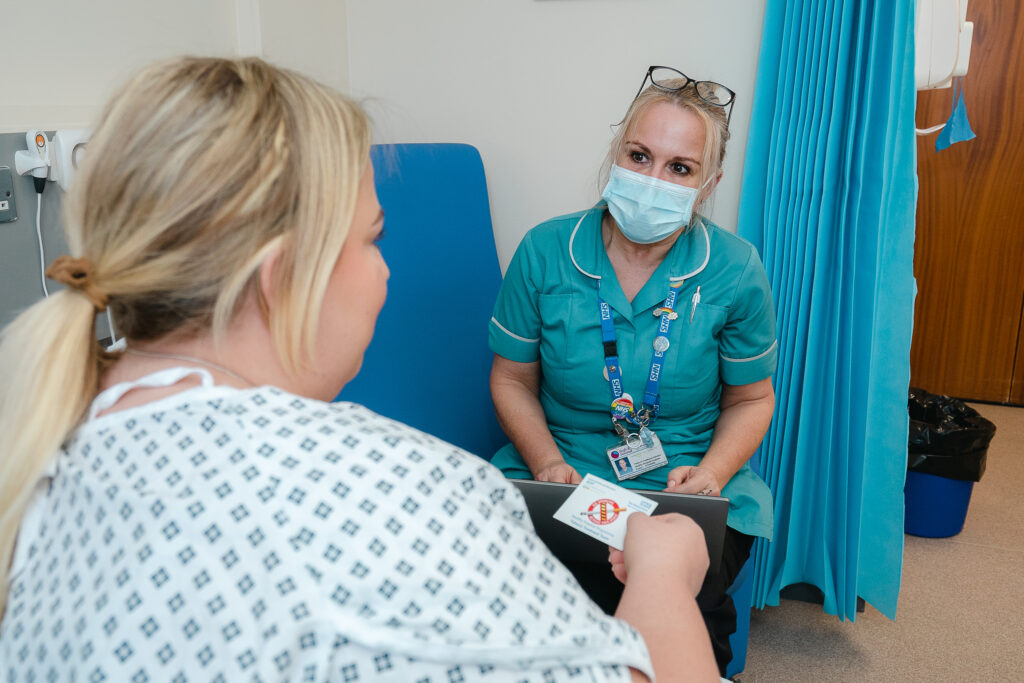My day as a Tobacco Dependency Treatment Adviser
Tobacco Dependency Treatment Adviser Sally has been working at Rotherham General Hospital, South Yorkshire, for two years. She began working as a healthcare support worker during the peak of the pandemic and now supports patients and staff to live healthier lives by helping them to stop smoking.
The NHS Long Term Plan, commitment is to offer people admitted to hospital and who smoke, including specialist mental health hospitals, an NHS funded tobacco dependency treatment by the end of March 2024. Patients will be linked to ongoing support in the community when they’re discharged.
A typical day
“Coffee in hand, I check the referral system where an inpatient’s smoking and alcohol status reports are held for all patients and let us divide the workload across the team. Then it’s a ward round where we chat to people about their smoking habits and why they took up smoking, which allows us to support and motive people to quit.”
What happens next
“The patient’s notes are really important; they allow us to understand what type of help maybe needed and we can also discuss how often they smoke and when. For example, someone may have an abscess in their mouth or a facial injury so I wouldn’t give them an oral nicotine replacement therapy. Alternatives include nicotine patch, lozenges or a mouth spray.”
The patient journey
“For those in hospital overnight, I check in with them the next day, making sure they’re alright and to see if they are still trying to go out for a cigarette! If they are this is a good chance to check why. It may be the dose needs increasing or lowering. So far today I’ve seen 10 patients and it is still early.
“I have a clinic in the afternoon where I follow up patients who’ve been discharged over the phone. This is to check everything is ok with them and the meds they have; and to provide further motivation and support. They’re then fully discharged from our care and referred to the community team which arranges appointments to ensure there’s help and support for up to 12 weeks after discharge and encourages them to set a quit date.
“We also have a clinic for hospital staff too where they can book in for smoking cessation advice, 20 staff members have signed up recently, which is really good”.
It’s quite a journey being a smoker yourself to being that person whose job it is to help another stop smoking!
“If somebody said to me now ‘what I liked about smoking?’ I could honestly say I didn’t have a clue! I was introduced to cigarettes when I was 12, I thought I was cool, you know at school behind the bike sheds. Years later I found a tumour in my neck, although it was benign, it was enough of a wakeup call! I then understood the dangers of smoking, cancer, stroke heart disease. I wasn’t going to risk ill health. I finally quit on my wedding day 10 years ago. I used e cigarettes to wean me off and I fully quit smoking 4 years ago. I’m proud to share my experience with patients because I know what it’s like and that’s a big help for the other person. I’ve changed quite a few lives; I’ve come across patients who are back in hospital and have quit. This is a real joy for me and the team to hear, best of all I know we’ve made a difference.”
In England, around 64,000 people die from smoking related illnesses each year. Smoking also increases the risk of developing over 50 serious health conditions including cancer, heart disease, heart attacks and stroke. Tobacco use is having a particularly negative impact on people with Severe Mental Illness (SMI). Life expectancy for people living with SMI is 15-20 years lower than the general population and smoking is the single largest contributor to this gap.
Having support if you want to give up smoking is helpful. Research shows that a person’s chances of quitting are doubled if they use a nicotine replacement therapy prescribed by a doctor, pharmacist, or tobacco dependency adviser. Combining these stop smoking therapies with expert support makes someone three times more likely to stop smoking successfully.
If you’re thinking of quitting smoking, find out how you can get help and support on the NHS.uk website: Better health – quit smoking.

